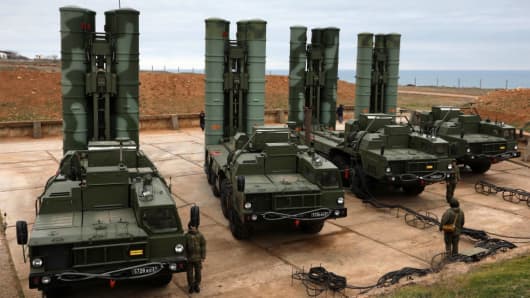WASHINGTON — At least 13 countries have expressed interest in buying a Russian missile system instead of platforms made by American companies, despite the potential for triggering U.S. sanctions, according to people with first-hand knowledge of a U.S. intelligence assessment.
One of the people, who declined to be named, said that Saudi Arabia, Qatar, Algeria, Morocco, Egypt, Vietnam, and Iraq have all discussed buying the S-400 missile system from Russia. However, the U.S. expects that a handful of countries will fold to diplomatic pressure.
The S-400, a mobile long-range surface-to-air missile system, is the Kremlin's answer to America's Patriot and THAAD platforms. Lockheed Martin makes the THAAD, or terminal high altitude area defense, system, while Raytheon makes the Patriot.
The Pentagon deferred questions about this story to the White House, which did not comment.
Any potential economic or political penalties would come under the Countering America's Adversaries Through Sanctions Act, which President Donald Trump signed in August 2017. In September, the U.S. slapped sanctions on China for buying fighter jets and missiles from Russia. However, the U.S. could grant waivers.
China, India and Turkey have already signed purchase agreements with the Kremlin. China, which is embroiled in a trade battle with the U.S., is in the middle of receiving its final shipment of the S-400 system. India, the top buyer of Russian arms, signed a deal with Moscow for the S-400 last month. Turkey, a NATO ally, is slated to receive its S-400 next year and is expected to have the system ready for use by 2020.
When asked why nations seek to buy the S-400 instead of America's Patriot or THAAD systems, one of the people with knowledge of the intelligence report explained that foreign militaries aren't willing to stick with the cumbersome process of buying weapons from the U.S. government.
"Many of these countries do not want to wait for U.S. regulatory hurdles," the person said. "The S-400 has less export restrictions and the Kremlin is willing to expedite sales by skipping over any regulatory hurdles. It's like buying it off the shelf," the source added.
Also, while it's not clear how much the countries would pay for either system, Russian arms are generally considered less expensive than U.S. weapons and come without extensive maintenance support.

